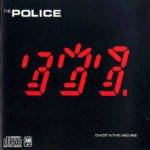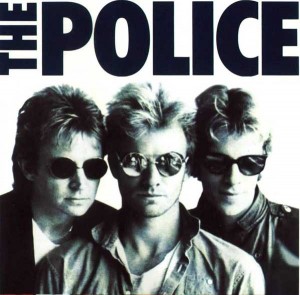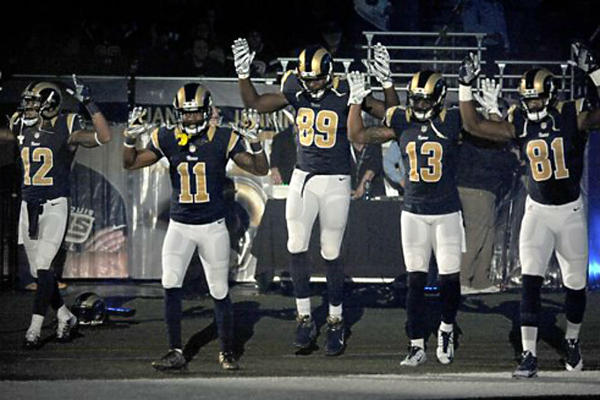The 80’s was a decade of growing pains for Rock n Roll. Disco was under attack from traditionalists who were sick of the digital displays and lack of creativity. Many hair bands were known more for off stage debauchery than their musical skills and old school staples were updating their sounds in an effort to bring in a new generation of fans, much to the dismay of their existing supporters.
In the midst of all this change and uproar was a handful of bands who decided not to change their style to fit the hot right now trend. They avoided the disco pitfall and the overly electronic approach of the time, instead preserving the foundation of their style while growing organically. One of the most successful at taking that road less traveled was The Police and two of the three albums they released in the 80’s were also their best. Between Ghost in the Machine and Synchronicity, one has to be better.
The Police’s unique brand of fusion set them apart from their contemporaries almost immediately. The mix of rock, reggae and jazz created a light whisper of ska, but it was a little too pop to garner that label.
 Ghost in the Machine found the trio playing with pop construction, but adding a heavier dose of jazz with brass backing Sting’s lyrics. The album was all over the place in a truly artistic sense as the band managed to combine different paces, managing rock and pop, whimsical and profound all in the same release without the final product being weighed down by its own eclecticism. Even though the band incorporated a new producer and in retrospect weren’t happy with all of the changes to their original construction, they managed to produce one of the best albums of the decade with some of their most revered classics in tow.
Ghost in the Machine found the trio playing with pop construction, but adding a heavier dose of jazz with brass backing Sting’s lyrics. The album was all over the place in a truly artistic sense as the band managed to combine different paces, managing rock and pop, whimsical and profound all in the same release without the final product being weighed down by its own eclecticism. Even though the band incorporated a new producer and in retrospect weren’t happy with all of the changes to their original construction, they managed to produce one of the best albums of the decade with some of their most revered classics in tow.
The pulsating, hard hitting “Demolition Man” has been covered by countless other artists, but none managed to live up to the effectual rip of the original. “Every Little Thing She Does is Magic” was the cutest of finger-snapping, happy-faced love songs and “Rehumanize Yourself” along with “Too Much Information” were morose tunes about human drama and perplexity. They were all different to the ear, yet all the same in their desire to cross sonic and thematic borders. As a group, the songs earned both commercial and critical success and have made everybody and their cousins “Best Of…” list. Even in the middle of their global success, kick started by Ghost in the Machine, the trio decided to pursue solo careers. However, prior to the break up, the crew managed to release one last album which many count as their greatest.
 The development and recording of Synchronicity was a contentious process with threats of quitting as well as fisticuffs allegedly involved in its creation. Maybe it was all the unbridled emotion present that helped craft one of the best albums of all time. Who knows? But Synchronicity was exceptional in detail, sophisticated in theme, and just an absolute joy to listen to.
The development and recording of Synchronicity was a contentious process with threats of quitting as well as fisticuffs allegedly involved in its creation. Maybe it was all the unbridled emotion present that helped craft one of the best albums of all time. Who knows? But Synchronicity was exceptional in detail, sophisticated in theme, and just an absolute joy to listen to.
The album tackled pain and mourning, both personal and shared. The production was just as dark, eschewing the once sun-drenched Caribbean tinge for a gloomier soundscape with multiple layers of sonic textures that backed up the feel of the heavier lyrics. Calamity and tragedy never sounded so beautiful.
The tracks included an on-bended-knee plea for a connection to a higher power called “O My God.” The topic reoccurred in “Synchronicity I and II,” a pair of raucous interpolations of the chaos that people visit upon themselves and each other. Sting’s lyrics suggested a cosmic connection between us all that we have tossed to the side through our technological hubris; a nightmare masquerading as a dream. A need to re-invest in the broken bond.
“Every Breath You Take” was the trio’s biggest hit and drenched with a refusal to let the past go. “King of Pain” played as a somber cry for help from a man who endured what he believed to be day in day out hopelessness and “Wrapped Around Your Finger” was a declaration that his wife sold him a bill of goods before he put the ring on her finger. It was all so deliciously depressing, but the melancholy of Sting’s post divorce mind-state and his constant bickering with the rest of the group led The Police to a masterful conclusion.
Off the beaten path worked well for The Police, as both albums went on to multi-platinum sales and critical acclaim, but one has to surpass the other. Is it the world music diversity of Ghost in the Machine? Or is it the tightly conceptualized, haunting pessimism of Synchronicity? You decide.






One thought on “Classic Clash: The Police-Synchronicity Vs. Ghost In The Machine”